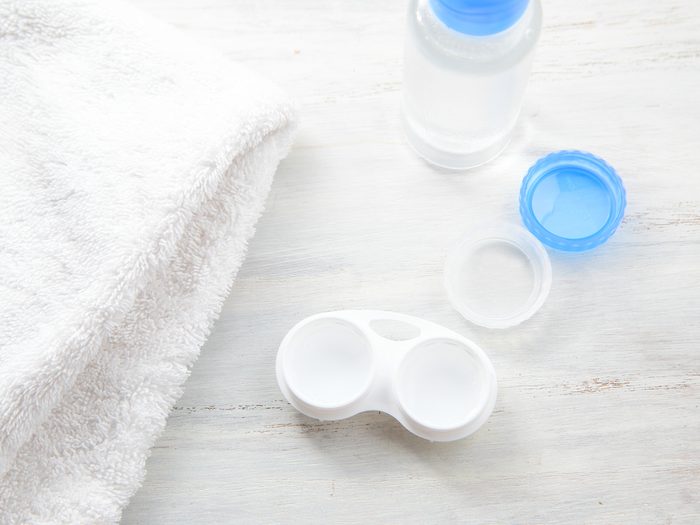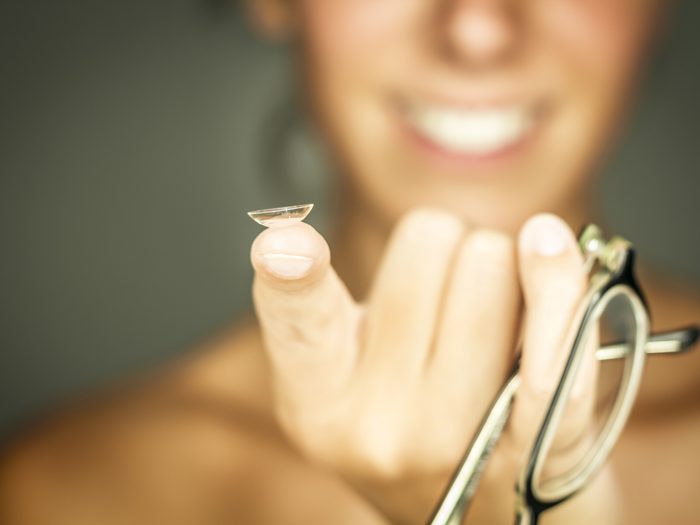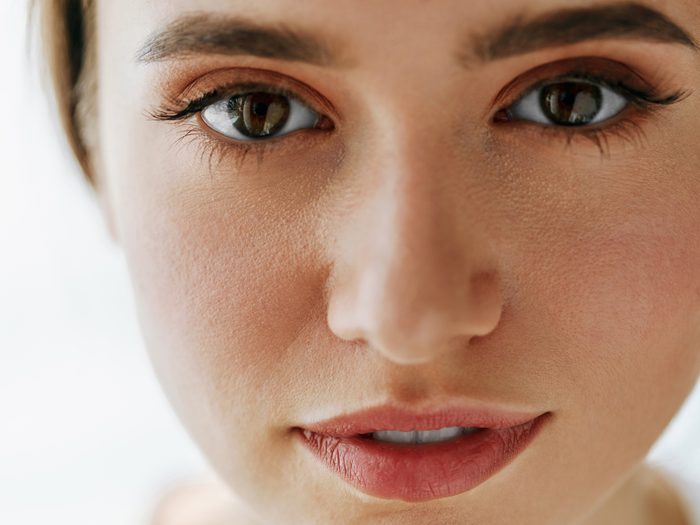
Not seeing an eye professional
Think you have perfect vision? You may be surprised. According to Essilor Canada, as many as 1.8 million Canadians are living with uncorrected vision. And an eye exam isn’t just about seeing clearly. Your eyes can tell a lot about your health and even help your doctor detect several health conditions including diabetes, cancer, thyroid disease and high blood pressure.
Adults should have a comprehensive eye exam every two years. The Canadian Association of Optometrists recommends annual eye exams for those over 65.

Not having a pair of glasses
“I always tell my patients there’s no such thing as glasses or contacts. It’s glasses or glasses and contacts,” says Clearly.ca optometrist and vision ambassador, Dr. Justin Asgarpour.
For example, if you happen to get an eye infection you won’t be able to wear contacts until the infection has cleared. And if you don’t have a pair of glasses you’re effectively blind during that time, says Dr. Asgarpour.

Driving without prescription eyewear
Not everyone wears their required prescription eyewear while driving. A Vector poll conducted for Clearly.ca found 1 in 4 respondents drove at least twice in the past 12 months without corrective eyewear for trips shorter than 30 minutes. What’s even more alarming is that 21 percent of Canadians admit to driving on a highway without their prescription eyewear at least twice in the last 12 months.
Whether or not you think these statistics are significant, it is a safety problem. “The World Health Organization has declared poor eyesight among the main factors for road crashes, with 1.25 million people killed in road crashes and 50 million more left seriously injured across the world each year,” says Arnaud Bussieres, CEO of Clearly.ca.

Flushing your contact lenses down the toilet
Do you toss your contact lenses in the garbage or flush them down the toilet? Disposing of your lenses this way is harmful to the environment – and it’s totally avoidable. (Plastic straws aren’t just bad for the environment – they’re bad for your health, too.)
“Contacts are recyclable,” says Dr. Asgarpour. “Just put them right into the bin with your other plastics. In fact, all aspects of the contact lens packaging are recyclable; whether it’s the cardboard packaging it comes in, the plastic tray or even the foil top.”

Wearing your contacts for too long
“With contact lenses you’re not supposed to wear them 24/7. They’re pieces of plastic essentially covering the eye and your cornea. And when you put a piece of plastic over the eye it hinders the ability for the eye to breathe properly,” says Dr. Asgarpour. “Contacts are designed to be worn 12, sometimes 14, hours a day. When you start to over-wear them, the cornea can suffocate and that causes some issues.”

Ignoring dry eyes
Winter is dry eye season but that doesn’t mean you have to live with dry eyes for four months out of the year. Especially considering dryness can damage your vision over time. “Long term untreated dry eye gives you an increased risk of developing chronic red eyes, eye infections such as pink eye and lid infections such as styes,” says Dr. Judy Parks, an optometrist with Ancaster Eye Clinic. “In extreme cases of untreated dry eye, people can develop loss of sensitivity at the surface of the eye and permanent scarring.”
Try using a humidifier, stay hydrated and take frequent breaks away from your computer, reminding yourself to blink often. Artificial tears are your best option for immediate relief at home, says Dr. Parks. “Systane Complete Lubricant Eye Drops is an ideal first-line treatment option for people who suffer from all types of dry eye, and I recommend it to my patients because it is has a multitude of benefits – it replenishes the tear film, reduces inflammation, stabilizes the tears and is long lasting.”

Staring at your computer for too long
How many hours do you spend looking at a screen each day? If you’re like the majority of adult Canadians (72 percent), you spend seven or more hours in front of three different electronic devices each day. According to research from Essilor Canada, 90 percent of Canadian adults have at least one eye-related problem linked to digital devices, such as tired eyes, headaches, disrupted sleep and neck or back pain. It’s known as computer vision syndrome (C.V.S.) and it’s becoming more common as our daily screen time increases.
“More and more often, I’m seeing patients come into my clinic who are experiencing dry eye because they’re forgetting to blink while staring at their computer, TV and phone screens,” says Dr. Parks. Experts recommend frequent breaks to help reduce the impact on your eyes. “A good rule of thumb is the 20-20-20 rule: every 20 minutes, look at something that is at least 20 feet away from your eyes for at least 20 seconds.”

Not protecting your eyes from blue light
Blue light is high-energy visible (HEV) light and there are now lenses you can get with a special coating to protect your eyes from it. “Blue light comes out of the sun naturally but it also comes out of screens – computers, tablets, smartphones,” says Dr. Asgarpour. “In the past we weren’t staring at these screens for 10 hours a day. Now we are and this blue light is really straining on the eyes.”
And you don’t need a prescription to get glasses with digital protection, says Dr. Asgarpour. In fact, he says some of his patients have started requesting their children get a pair of glasses specifically for screens (aka computer glasses). “A clear prescription with that blue coating is not a bad idea,” he says. It’s becoming especially important given that screen time is on the rise among children.

Not wearing sunglasses
You’re probably wearing sunglasses during the summer, but did you know it’s important to wear them year-round? The sun’s UV rays reflect off of snow and can even cause damage in the dead of winter. Be especially mindful when you’re outside for long periods of time like at the ski hill.
Here’s help for getting rid of a stye.

Neglecting your diet
A healthy diet can do a lot to protect your eyesight. Fish are a great source of omega-3 fatty acids, proven to reduce the risk of dry eyes. Lutein, found in spinach, may help prevent age-related macular degeneration and cataracts. And orange veggies like sweet potatoes and carrots are rich in vitamin A, which can help improve night vision.
Next, discover 56 old-time home remedies we’ve forgotten – but need to bring back STAT.
